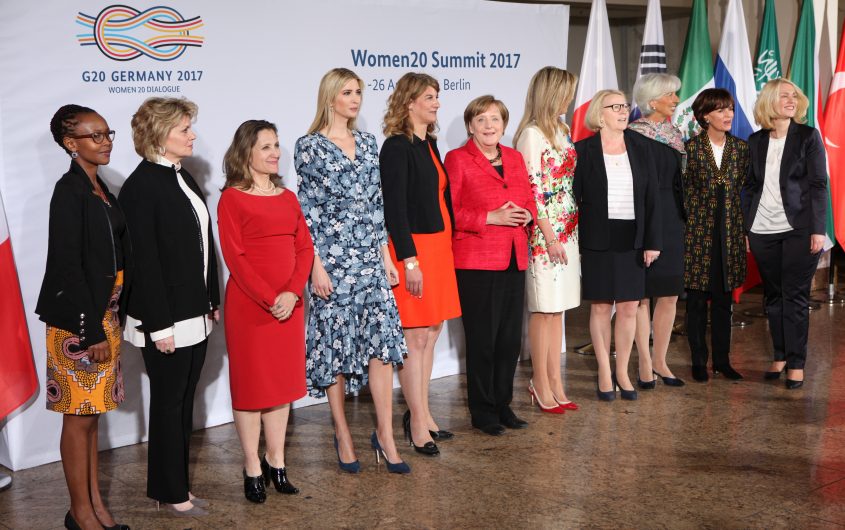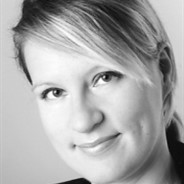
U.S. Embassy Berlin via Flickr
AGI Asks: What is Angela Merkel’s Legacy on Gender Equality?

Anne Jenichen
Aston University
Anne Jenichen is Lecturer (Assistant Professor) in Politics and International Relations at the Aston Centre for Europe, Aston University, Birmingham, UK. Her research focuses on the political impact of international norms and organizations; European human rights policy; the rights of disadvantaged groups, such as women and religious minorities; and on the politicization of religion in Europe. She holds a Diploma (equivalent to an MA) in Political Science from Free University Berlin and a Doctoral Degree in Political Science from the University of Bremen, Germany, where she also taught political science and European studies before joining Aston. She was Volkswagen Foundation Fellow at the Transatlantic Academy in Washington, DC (2014-15), Visiting Research Fellow at the Institut d‘Études Européennes, Université Libre de Bruxelles (2011), Research Fellow at the United Nations Research Institute for Social Development (UNRISD) in Geneva (2007-09), and Visiting Fellow at the Department of Sociology and Anthropology, Northeastern University, Boston (2007). For the Heinrich Böll Foundation in Berlin, she coordinated an international research project on “Religion, Politics, and Gender Equality” (2007-2010).
She is a 2018-2019 participant in AICGS’ project “A German-American Dialogue of the Next Generation: Global Responsibility, Joint Engagement,” sponsored by the Transatlantik-Programm der Bundesrepublik Deutschland aus Mitteln des European Recovery Program (ERP) des Bundesministeriums für Wirtschaft und Energie (BMWi).

Louise K. Davidson-Schmich
University of Miami
Louise K. Davidson-Schmich is Professor of Political Science at the University of Miami. Davidson-Schmich came to UM in 2000 after receiving her PhD and MA in political science from Duke University and completing her undergraduate degree in international relations at Brown University. In 2016 she was a New Zealand Fulbright US Scholar at the Victoria University of Wellington.
Her research interests include gender and politics as well as politics in long-term democracies. She is the author of Gender Quotas and Democratic Participation: Recruiting Candidates for Elective Office in Germany (University of Michigan, 2016) as well as Becoming Party Politicians: Eastern German State Legislators in the Decade Following Unification (University of Notre Dame Press, 2006). Davidson-Schmich is also the editor of Gender, Intersections, and Institutions: Intersectional Groups Building Alliances and Gaining Voice in Germany (University of Michigan, 2017) and of a 2011 special issue of the journal German Politics entitled “Gender, Intersectionality, and the Executive Branch: The Case of Angela Merkel.” Davidson-Schmich is a member of the executive committee of the International Association for the Study of German Politics and serves on the editorial boards of Women, Politics and Policy, German Politics, German Politics and Society, and the German Studies Association’s Spektrum book series. She has published in journals including Party Politics, The Journal of Legislative Studies, and Democratization and been awarded funding from the Alexander von Humboldt Foundation, Fulbright, and the National Science Foundation’s Advance program (called SEEDS at the University of Miami).

Petra Ahrens
Tampere University
Petra Ahrens is Senior Researcher in the ERC-funded research project EUGenDem, Tampere University, Finland. She focuses on gender policies and politics in the European Union, civil society organisations, and gender equality in Germany. She has published in journals such as the Journal of Common Market Studies, Parliamentary Affairs, and West European Politics. Her latest books cover Gender Equality in Politics: Implementing Party Quotas in Germany and Austria (2020, co-authors Katja Chmilewski, Sabine Lang, Birgit Sauer), Gendering the European Parliament. Structures, Policies, and Practices (2019, co-editor Lise Rolandsen Agustín), and Actors, Institutions, and the Making of EU Gender Equality Programs (2018).

Phillip Ayoub
Occidental College
Phillip M. Ayoub is Associate Professor of Diplomacy and World Affairs at Occidental College. His research bridges insights from international relations and comparative politics, engaging with literature on transnational politics, gender and politics, norm diffusion, and the study of social movements. Alongside several articles, he is the author of When States Come Out: Europe’s Sexual Minorities and the Politics of Visibility (Cambridge, 2016) and co-editor, with David Paternotte, of LGBT Activism and the Making of Europe (Palgrave, 2014). In 2014, he was the recipient of the American Political Science Association’s Human Rights and Politics & Sexuality section awards for Best Dissertation. The following year, he received the European Union Studies Association's biennial 2013-2014 award for Best Dissertation. He also received the 2014 Janice N. and Milton J. Esman Graduate Prize for distinguished scholarship (from Cornell University), the 2017 Best Article of the Year Award from the Council of European Studies’ Gender and Sexuality Research Network, and the 2018 Provost Award for Outstanding Early-Career Scholarly Achievement (Drexel University). Please visit www.phillipmayoub.com for further information.
He is a 2018-2019 participant in AICGS’ project “A German-American Dialogue of the Next Generation: Global Responsibility, Joint Engagement,” sponsored by the Transatlantik-Programm der Bundesrepublik Deutschland aus Mitteln des European Recovery Program (ERP) des Bundesministeriums für Wirtschaft und Energie (BMWi).

Sabine Lang
University of Washington
Sabine Lang is Professor of European and International Studies in the Henry M. Jackson School of International Studies at the University of Washington, where she directs the Center for West European Studies/Jean Monnet Centre of Excellence. Her work focuses on gender politics and civil society in comparative perspective and in the EU. Her most recent publications are Gender Equality in Politics: Implementing Party Quotas in Germany and Austria. Springer 2020 (co-authors Petra Ahrens, Katja Chmilewski Birgit Sauer) and Gendered Mobilizations and Intersectional Challenges: Contemporary Social Movements in Europe and North America. ECPR Press/Rowman&Littlefield 2019 (co-edited with Jill Irvine and Celeste Montoya).
AGI Asks:
What is Angela Merkel’s legacy on gender equality in Germany?
Petra Ahrens, Phillip M. Ayoub, & Sabine Lang
Tampere University, Occidental College, & University of Washington
2021 marks the end of the era ‘Merkel’ in German politics. The four-term chancellor will leave office after having steered Germany through a series of international and domestic challenges and in the process earning herself the Forbes’ title of “most powerful woman in the world” on several occasions. Yet there remain open questions surrounding her accomplishments on gender equality. Indeed, Germany has historically been a laggard in adopting gender equality measures. However, according to the 2019 European Gender Equality Index, ‘Germany is progressing toward gender equality faster than the EU’, having gained 6.9 points between 2005 and 2017 (European Institute for Gender Equality 2019) and notable gender policy successes are apparent. How can we make sense of this policy transformation and to what degree has Angela Merkel contributed to, stalled, or hindered gender policy advancements?
Our upcoming special issue in German Politics engages with these questions. Our findings suggest that Merkel’s legacy on gender equality is complex. We do sometimes identify an active role (whether public-facing or behind the scenes) by Merkel – where she has led the change toward more gender equality —, but in most gender equality domains, she pivots to mechanisms that round a concept we call “leading from behind.” We define “leading from behind” as an (in)direct facilitating role that wavers between active and passive leadership; one that some women leaders facing the constraints of conservative parties may have a greater need to play in order to advance gender equality policy. Marriage equality is one such example: Merkel would toe the line by voting against the actual policy, though having released the party whip knowing full well that it would pass. Merkel has been willing to evolve and compromise in many such cases, often involving considerable persuasion skills from other actors and parties. In sum, over her tenure, active leadership on gender turned out to be the least pronounced in Merkel’s repertoire. Thus, change is typically not directly initiated by her but brought to her by cabinet coalition ministers from center-left parties or by women allies within her party.
Louise Davidson-Schmich
University of Miami
Over sixteen years in office Angela Merkel’s various coalition governments adopted a range of progressive policy positions on gender and sexuality few would have anticipated. The first such move came in 2006 when the General Equal Treatment Act (Allgemeines Gleichbehandlungsgesetz) banned discrimination on the basis of race or ethnicity, sex, religion, disability, age, or sexual identity and established a federal agency to oversee implementation of the law. This was followed by a series of reforms to Germany’s parental leave laws, making it easier for mothers to continue in paid employment and for fathers to spend time with newborn children. Merkel’s governments also funded an expansion of early childhood centers (Kitas) for children aged one to three, approved the introduction of a statutory minimum wage, primarily benefitting women workers, and mandated quotas for women on corporate boards.
When Merkel first took office same-sex couples could legally enter into “Registered Life Partnerships” with fewer rights and responsibilities than heterosexually married couples. After making a series of reforms to bring Life Partnerships closer to marriage, in 2017 the Chancellor allowed a conscience vote in the Bundestag through which Ehe für Alle (Marriage for Everyone) was legalized. Under her watch the Federal Republic recognized the presence of intersex Germans, creating a legal designation “diverse” for those born neither male nor female. LGBT rights were also expanded with the decision to allow men who have sex with men to donate blood, the 2020 ban on conversion “therapy” for minors, and the end to policies requiring sterilization or divorce before transgender Germans could legally change their sex on identity documents.
Many of the above legal changes came not at the impetus of Merkel’s CDU/CSU, however, but were prompted by pressure from their SPD coalition partner, Federal Constitutional Court decisions, EU pressure from Brussels or the European Court of Justice, or at the encouragement of the United Nations and domestic interest organizations. Often the legal reforms made were the bare minimum needed to comply with court or EU rulings and did not extend as far as feminist or LGBTI activists would have preferred. For example, despite the corporate board quota for women, many large companies still have no women on their boards; while conversion therapy was banned for minors, LGBT activists’ calls for banning the practice for adults went unheeded. As a result, while Germany’s ranking in the European Union’s Gender Equality Index has improved during Merkel’s Chancellorship, today Germany ranks 12th in the EU, roughly at the EU average, in terms of gender equality. As of 2021 the International Lesbian and Gay Association (ILGA) also ranked Germany 12th of the EU countries in their Rainbow Europe ranking of LGBTI rights. While Merkel’s government took many steps forward toward gender equality and full citizenship for sexual minorities, steps that seemed improbable in 2005, it is also likely that these steps were far smaller than what might have occurred had the SPD/Green/FDP/Left parties led the government.
Anne Jenichen
Aston University
Angela Merkel has been the first female Chancellor of Germany and one of the longest-serving female heads of government worldwide. Her legacy on gender equality in Germany, though, is mixed. Her leadership certainly has been an inspiration to many women, and appointing two female ministers to a formerly male-dominated area such as defense were welcome moves to break up the gendered division of labor between cabinet portfolios. However, during Merkel’s tenure, the number of women in her cabinets progressively declined, from about 40 percent in her first cabinet to ca. 30 percent in her fourth, and other important ministries, such as for the Interior, Foreign Affairs, and Finance, remained in the hands of men.
The picture is similarly mixed when looking at policy changes. On the one hand, Germany has moved towards a more gender-egalitarian policy regime during the past sixteen years, earning Merkel the label of feminist by example or reluctant feminist. Policy accomplishments during Merkel’s tenure include the adoption of the General Equal Treatment Act and the Payment Transparency Law that supports women to enforce their claim to equal pay, the continuous expansion of parental benefits and child-care infrastructure, the introduction of a minimum wage that disproportionally benefits women, a gender quota for supervisory boards of private companies and the rule of minimum participation of at least one woman per executive board with at least three members, as well as legalization of same-sex marriage. However, the impetus for these changes frequently came from others, such as the Ministers for Family Affairs, Senior Citizens, Women and Youth, or the SPD in the Grand Coalition, often against initial opposition from Merkel. Due to CDU/CSU opposition against more far-reaching reforms, inconsistencies persist. The joint taxation of married couples, reinforcing the male bread-winner model, for example, has stayed untouched. The provision of a right for employees to return to full-time employment after a family-related reduction of working time (predominantly mothers) did not come to fruition due to the opposition from Christian Democratic parties and employers, and the equal pay reform and gender quota for boards were adopted only for large companies. Therefore, calling Merkel a feminist may be an exaggeration, particularly as she herself has always avoided that label for herself. Nevertheless, by inspiring women worldwide and helping to bring about everyday improvements to women’s lives, her legacy for gender equality is a positive one and goes far beyond that of her predecessors.








